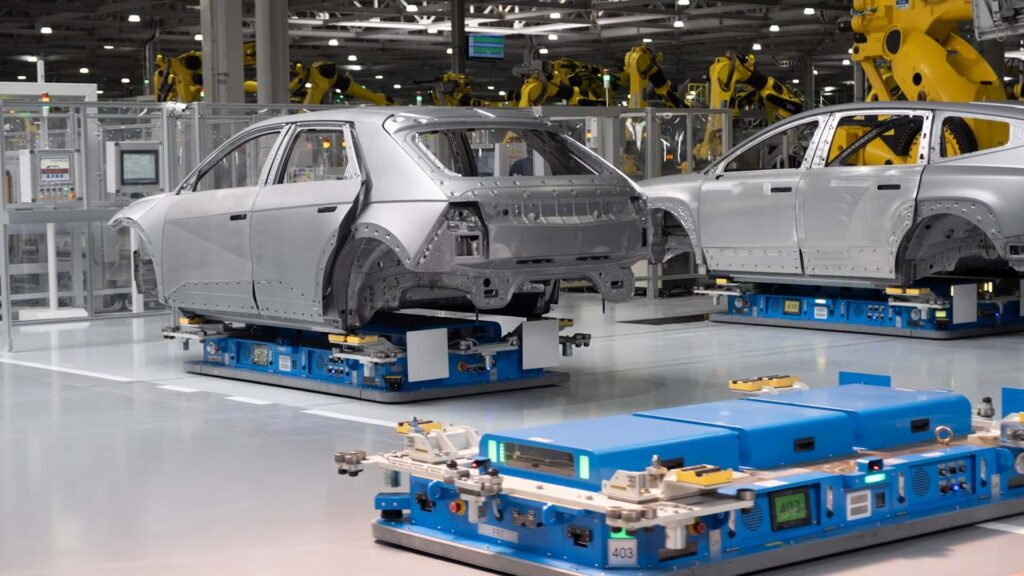The Hyundai Motor Group’s new Metaplant in Savannah, Georgia is making headlines as the state’s largest economic development project ever. With plans to produce 300,000 fully electric cars annually, the automaker has now set its sights even higher, aiming for 500,000 vehicles per year.
The decision to increase production capacity comes as Hyundai anticipates potentially uneven demand in the electric vehicle market. Global CEO José Muñoz explained, “We soon saw that the pace of electrification was not going to be as fast as everybody thought. Then we saw that the hybrid age was moving much faster. We have been flexible before, and we’re going to be flexible now.”
Currently, the Metaplant is already manufacturing the Ioniq 5 and Ioniq 9 electric SUVs, the first of several new EV models from the Korean conglomerate to be produced in the United States. Unlike their Korean-built predecessors, these vehicles come equipped with a Tesla-style North American Charging Standard (NACS) plug from the factory and have native access to Tesla’s Supercharger network.
Officials from Kia, another division of the Hyundai Motor Group, have also hinted that around 40% of the cars manufactured at the Metaplant will be from their brand. However, specific details about which Kia vehicles will be produced at the facility have not yet been disclosed.
The expansion of the Metaplant’s production capacity signifies Hyundai’s commitment to meeting the evolving needs of the electric vehicle market. With a focus on flexibility and adaptability, the automaker is poised to make a significant impact on the automotive industry with its cutting-edge electric and hybrid vehicle offerings. Hyundai has been making significant strides in the hybrid vehicle market, with several popular models in their lineup. One of their standout offerings is the Tucson Plug-In Hybrid, which combines the versatility of an SUV with the fuel efficiency of a hybrid powertrain. This model boasts impressive electric-only range and quick charging capabilities, making it a great option for eco-conscious drivers who still need a practical vehicle for their everyday needs.
Another success story for Hyundai is the Sonata Hybrid, a midsize sedan that has been flying off the lots thanks to its combination of style, comfort, and fuel efficiency. The Sonata Hybrid features a sophisticated hybrid powertrain that delivers strong performance while still achieving impressive fuel economy numbers. With its spacious interior, advanced technology features, and smooth driving experience, it’s no wonder that the Sonata Hybrid has become a top choice for many hybrid sedan shoppers.
In addition to these models, Hyundai is also working on expanding its hybrid offerings with new and innovative vehicles. The company recently announced plans to launch several new hybrid and electric models in the coming years, as part of their commitment to sustainable mobility. This includes the introduction of hybrid versions of popular models like the Santa Fe and Kona, as well as all-new electric vehicles that will help Hyundai compete in the rapidly growing EV market.
Hyundai’s commitment to hybrid and electric vehicles is further exemplified by their investment in new manufacturing facilities. The company recently opened a state-of-the-art plant in Georgia, which is projected to be one of the region’s largest employers, generating more than 14,000 jobs. This facility will play a key role in producing Hyundai’s next-generation hybrid and electric vehicles, ensuring that the company remains at the forefront of sustainable transportation.
Overall, Hyundai’s focus on hybrid and electric vehicles is paying off, with strong-selling models like the Tucson Plug-In Hybrid and Sonata Hybrid leading the way. With new models on the horizon and investments in manufacturing facilities, Hyundai is well-positioned to continue making waves in the hybrid vehicle market for years to come. Hyundai’s Georgia Metaplant stands as a testament to the future of automotive manufacturing. This state-of-the-art facility is one of the world’s most advanced car factories, boasting a high degree of automated manufacturing and robotic labor. The plant was built from the ground up with the goal of producing cutting-edge electric and hybrid vehicles to meet the growing demand for sustainable transportation options.
In a recent interview, José Muñoz, the president and CEO of Hyundai Motor North America, revealed plans for the expansion of the Metaplant to accommodate the production of hybrid vehicles. While this expansion will require significant investment, Muñoz expressed confidence in Hyundai’s ability to meet the challenges of the evolving automotive market.
The Hyundai Motor Group has firmly established itself as a key player in the electric vehicle (EV) market, with its three brands—Hyundai, Kia, and Genesis—ranking second only to Tesla in U.S. EV sales last year. Surpassing 100,000 all-electric vehicles sold for the first time, the Hyundai Ioniq 5 has emerged as one of the top-selling EVs in America.
The grand opening of the Georgia Metaplant comes at a time of uncertainty for the American auto industry, with President Donald Trump’s administration threatening tariffs on foreign-made vehicles and seeking to end EV tax credits. Despite these challenges, Muñoz emphasized that the decision to build the factory in the U.S. was made before any tax incentives were in place. By producing EVs and hybrids domestically, Hyundai aims to avoid potential tariffs on foreign-made vehicles.
During a recent meeting at the White House, Euisun Chung, the executive chair of Hyundai, announced a $6 billion investment in a steel plant in Louisiana, further solidifying the company’s commitment to U.S. manufacturing. Muñoz reiterated that Hyundai’s investment in the Georgia Metaplant was driven by a long-term vision for sustainability and innovation, rather than short-term incentives.
As Hyundai continues to ramp up production of electric and hybrid vehicles at the Georgia Metaplant, the company remains focused on meeting the growing demand for eco-friendly transportation solutions. With the addition of the larger Ioniq 9 to its lineup, Hyundai is poised to capitalize on the momentum of the EV market and solidify its position as a leader in sustainable mobility.

